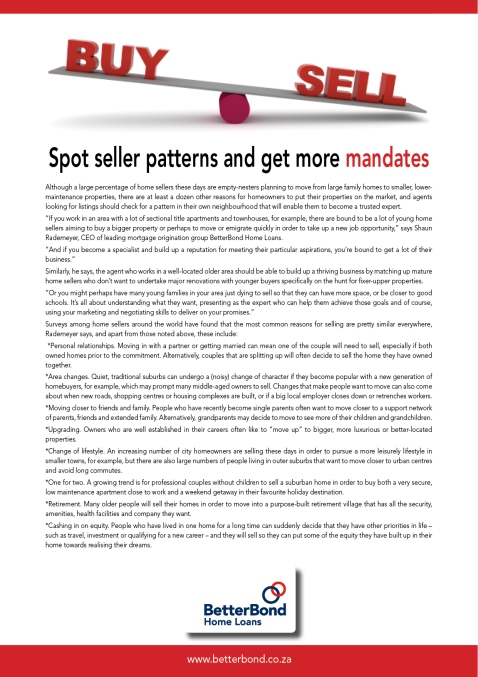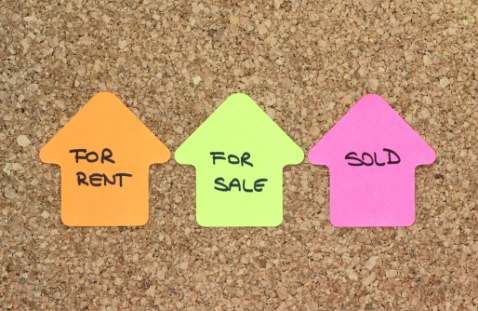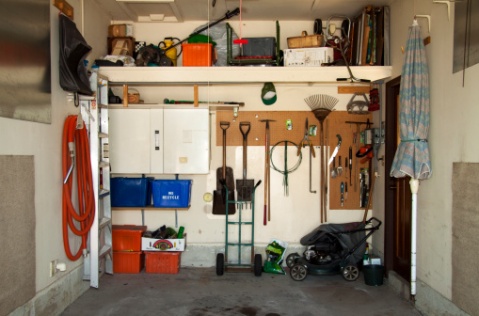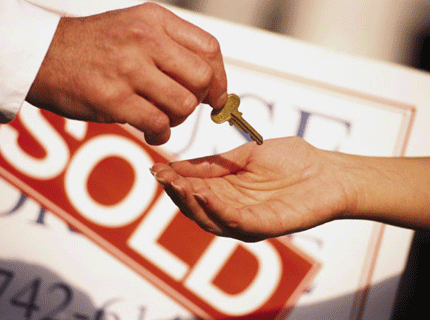Your best home improvement bets of the year

First impressions definitely count among homebuyers, which is why prospective sellers often feel the need to make some improvements before their properties go on show.
However, they do need to know that while these improvements may well add to the appeal of the property, most will not add as much to the sale price as they cost to complete, according to the 2015 Cost v Value Report* just released by Remodeling magazine.
The report is based on a survey conducted among thousands of estate agents in which they are asked to estimate the resale return that homeowners are likely to achieve on the year’s most 36 most popular home improvement projects.
And more often than not, according to Remodeling Editor-in-Chief Craig Webb, the simpler and less expensive the project, the higher its cost-to-value ratio – although only one will currently deliver a resale return of 100% or more. This is the replacement of a standard wooden front door with a steel door to improve security.
In the mid-price range, the next most worthwhile projects that SA homeowners might consider are:
- Garage door replacement (88,4%);
- Addition of a wooden deck (80,5%);
- Minor kitchen remodel (79,3%); and
- Window replacement with wooden windows (78,8%).
Other popular choices, such as the addition of an extra bathroom, or even the installation of a back-up generator to cope with loadshedding, will give homeowners a resale return of less than 60% – so it is fair to say that they are not really worth doing unless you are going to stay on in your home to enjoy them yourself.
In the high-price category, the only improvement project likely to deliver a resale return of more than 80% this year as a luxury garage door upgrade.
In short, homeowners who are planning to sell should really think twice before embarking on any major additions or alternations in order to entice potential buyers.
They may well be better off just making sure that the property as it stands is in excellent condition – and putting their renovation money towards the deposit on their new home.
How to get the price right
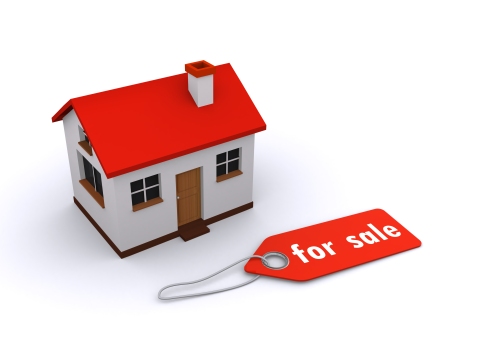 OK so you’ve decided to move, maybe to another suburb or town, or maybe just to a bigger or smaller place in the same area. But before you can carry out your plan, you have to sell your existing home – and in order to do that, you have to put a price tag on it.
OK so you’ve decided to move, maybe to another suburb or town, or maybe just to a bigger or smaller place in the same area. But before you can carry out your plan, you have to sell your existing home – and in order to do that, you have to put a price tag on it.
And this is the exact point at which a lot of home sellers come unstuck, because they don’t understand that potential buyers just don’t care about certain things – like how you found the perfect flooring for the kitchen or why you chose yellow tiles for the bathroom instead of beige – even if you think they should.
The fact is that these people have no emotional attachment to your home so all they care about is that it is in the area they want to live in, that it is well-maintained and in good condition, and most of all, that it is priced right in their estimation.
In short, price is king and when it comes down to it, your asking price will be the one thing that determines how long it will take to sell your home. Setting the price too high will reduce the number of prospective buyers who are interested in even taking a look at it because they will immediately see it as being too expensive for the area.
This will cause the property to “stick” in the market and when that happens, it can create the perception among other buyers that there is something wrong with it – and lead them to think that they can offer you much less than it is actually worth because you are probably desperate by now.
On the other hand, if you set the asking price too low, it will probably attract lots of prospective buyers – most of them skeptical about why it is so cheap. You may well get multiple offers but you will be in trouble if they don’t drive the price of your home up to its true market value.
So, you have to price right from the outset, using tangible factors. Here are four top tips for doing so:
Get a comparative market analysis (CMA).
Ask a reputable local agent for a CMA which compares your house with similar properties that have recently been sold in the area and gives you the asking prices, sold prices and time on the market for those properties. You can also draw suburb sold price reports from property websites like Property 24.
Be fair when you compare.
For example, the age of a property may also come into consideration when buyers are looking in your area because it can affect the condition. Buyers generally expect to pay more for brand-new homes so you probably can’t expect to get as much for your 20-year-old house as people have recently paid in that new development down the road – even if the homes there are similar in size and layout.
Consider the market.
The CMA may show that similar homes to yours were initially listed at higher prices than you have in mind – but that they were on the market for a very long time and then were actually sold for much less than you would expect. If the market is quiet and you’re looking to conclude a sale quickly, you may want to lower your asking price somewhat. On the other hand, if there is high demand in your area and a shortage of supply, you may feel justified in sticking with a slightly higher asking price.
Be realistic about improvements.
If you’ve recently renovated the bathrooms and repainted the whole house, you may feel justified in increasing your asking price. But be aware that you are very unlikely to recoup the whole cost of any improvement when you sell – especially the really pricey ones like adding on a room or putting in a new kitchen. Most likely these will just make your home more attractive to more prospective buyers and help you achieve a faster sale at market value.
Why you should polish up your bathroom before selling
 As every estate agent will tell you, spotless bathrooms are key selling points when putting your home on the market – coming a close second to an attractive kitchen – and it may not be as difficult as you think to put a sparkle in your buyer’s eye.
As every estate agent will tell you, spotless bathrooms are key selling points when putting your home on the market – coming a close second to an attractive kitchen – and it may not be as difficult as you think to put a sparkle in your buyer’s eye.
While luxury homes sometimes offer bathrooms on the scale of a Roman bath house, with stretches of marble and impressive columns, under-floor heating, steam showers and even fridges and fireplaces these days, even a modest update of an ordinary bathroom can increase the appeal of your home and bring about a quicker sale.
What is more, homeowners can expect to recover at least 70% of the cost of any bathroom renovation once they sell, according to the latest Cost v Value report from Remodelling Magazine.
If you can afford it, you should consider replacing the old bathroom suite, having the floor and walls tiled and installing a vanity. Home improvement guru, Bob Vila, has some great DIY options to check out for inspiration.
But if you’re on a very tight budget, or need to sell urgently, try just repainting the bathroom in a neutral shade and installing a large new medicine/makeup cabinet and some additional lighting for a quick fix
Then make sure all surfaces, especially mirrors and fittings, are polished up to a sparkle, hang some new towels and add attractive extras such as flowers, candles and bottles of bath oil for a luxurious look.
For more budget-friendly bathroom update ideas, take a look at these tips to keep your budget in check.
Don’t let tenants tangle your sale
With the demand for property still strong at the moment, a growing number of property owners believe the time is right to sell homes they have been renting out – but they should be aware that this can be difficult if they still have a tenant in place.
“Unfair as it may be, tenants generally have a reputation for not keeping homes in the best condition, and many potential buyers seeking a home for themselves will be reluctant to look at a property with a sitting tenant,” says Shaun Rademeyer, CEO of BetterBond, South Africa’s leading mortgage originator. “In many cases, even buy-to-let investors who might be interested in adding the property to their portfolio would prefer to find their own tenants.
“And incumbent tenants who do not want to move can create major problems for a seller. To start with, they may be difficult about giving an agent access to the property to show it to prospective buyers, or perhaps deliberately leave the home in a mess when they know the agent is coming round with potential buyers.”
He says tenants have also been known to try to block a sale by regaling potential buyers with every real or imagined fault in the property or the neighbourhood.
“In addition, property owners who have not made regular inspections may be in for a nasty shock when they decide it is time to sell because maintenance has been neglected, and expensive repairs are necessary before the property can be put on the market. And if pets or animals have been kept inside, the home will at the very least need thorough cleaning, and perhaps re-carpeting.”
There may, of course, be no problem where tenants have been carefully selected from the outset, says Rademeyer, and often if the property is to be sold, the best course is to first find out whether these sitting tenants might like to buy it themselves.
“But if that is not possible, it is generally better to give them reasonable notice and then prepare the empty property for sale, with the incentive for prospective buyers that it is ready for immediate occupation.”
Getting ready to sell? Don’t forget the garage
Before your home goes on show, you’ll probably spend a lot of time and effort on cleaning, painting, and gardening to make it look “just right” for potential buyers.
And while you’re at it, you shouldn’t forget about you garage, because this is an important amenity for many homebuyers.
If it’s full of boxes, tools, camping equipment, and an assortment of household items – as many garages are – they won’t be able to see where they could park their vehicles, or store their own goods, and while that won’t usually make or break a sale, it could easily detract from the good first impression you’ve worked so hard to create.
You can avoid this by taking the following steps:
- Have a good clear-out. What’s actually in all those boxes? Gather up everything that you don’t use any more – and probably never will – and sell it, donate it or dump it.
- Make the most of the available space by getting things off the floor. Any good hardware shop will offer a variety of hooks to hold bikes and other sporting equipment, garden tools, brooms, and umbrellas. Then add some shelves and possibly some wall cabinets for storing hand and power tools, nuts and bolts, pool chemicals, and paint cans, and already things will look much more orderly and uncluttered.
- Make sure everything is dusted and the floor swept. Use driveway cleaner or thinners to get rid of any oil spots.
- If you have an automatic garage door opener, make sure that it is working properly, and don’t forget the garage door itself. Giving it a fresh coat of paint or varnish if necessary is an easy step that is bound to enhance the overall “curb appeal” of your home.
Seven reasons why private sellers should not be selling their homes
This week’s article was contributed by John L. Bradfield, and originally appeared on his blog “This ‘n That”. John is a Real Estate professional with 20 years’ experience in this industry. He is based in Hermanus, the whale-watching capital of the world.
 At first glance, selling your home privately can seem like an attractive proposition. You’ll save the agents commission, right?
At first glance, selling your home privately can seem like an attractive proposition. You’ll save the agents commission, right?
In fact many private sellers are home owners in financial trouble, and are hoping to avoid paying the agent’s fee in order to clear an outstanding mortgage loan without “paying in”.
The reality is that many of these homes end up as “distressed sales”, and are auctioned by the bank at greatly reduced prices.
Sadly, in many of these cases the result can mean even greater financial hardship for the unlucky owners. In some cases the shortfall translates into a long-standing debt that will represent a financial burden for many years to come.
Many of these unfortunate experiences come about because private sellers are misinformed about the role of estate agents and about what an experienced realtor can bring to the process. Without access to relevant data, private sellers sometimes begin by overpricing their homes — based on other overpriced homes in the same area. There are a few pitfalls to avoid. Here are seven of the most important reasons why private sellers should not sell their homes:
7. Lack of time
Selling a house involves a great deal of time. Someone must be on hand to handle all enquiries any day of the week, including weekends, to show the house, work with prospective buyers, and deal with paperwork. You may be working full-time or you could be relocating. You could find it difficult to devote the necessary time to selling your home. This can result in lost opportunities that may be scarce in the current market. A full-time estate agent can devote the necessary time to showing your home, dealing with prospective buyers, and taking care of the paperwork.
6. Lack of objectivity
From a purchaser’s perspective, an estate agent brings an air of objectivity to the sale. One of the reasons that private sellers may find it difficult to deal with potential buyers, is a lack of the required detachment. The private seller’s natural emotional involvement with the home can leave potential purchasers feeling awkward and inhibited while viewing. An estate agent can help to assess potential offers from an objective and expert perspective, offering professional and researched opinions to help overcome the purchaser’s objections in a reassuring way.
5. Lack of security
Private sellers are faced with the problem of giving out their personal information to strangers. As a private seller you will have no screen between you and a potential buyer or a potential scam artist who may be trying to trick you into gaining occupation of your home. Even worse, you may be faced with a criminal inside your home who could try to steal things while looking around, or perhaps “case” the property and security systems for a much bigger crime at a later date. Estate agents deal with potential buyers on an ongoing basis, can preserve your privacy, and can usually tell if something doesn’t feel right, thereby preventing potential problems of this kind.
4. Working with unqualified buyers
In the current market less than 50% of potential buyers will qualify for a home loan. It’s sometimes difficult for private sellers to ask the probing questions that are required to thoroughly check out the financial capabilities of potential buyers. Sometimes a buyer has not properly investigated how much cash is required upfront for the deposit and transfer fees, leading to a failed transaction. A professional estate agent is trained to do a proper assessment that can save time and expense down the line.
3. Paperwork and legalities
Apart from the need to achieve familiarity with sale agreements and other legal documents, private sellers are faced with liability issues when dealing with buyers one-on-one. Laws dealing with property sales have increased and become more complicated in recent times. The new Consumer Protection Act is the most recent example of these.
A professional realtor is trained to deal with these legalities and provides the seller with the security of knowing that these issues will be properly taken care of. When drawing up the Deed of Sale, certain details can be contentious. An experienced estate agent can recognise the pitfalls and traps in any given situation, and do the drafting of special clauses in such a way that both parties are protected from nasty surprises or disappointments later on.
2. Lack of exposure
Private sellers must carry the costs of advertising and marketing, whether they sell their homes or not. Most private sellers don’t have the knowledge or resources to create enough awareness, and for these reasons they will not have the ability to select the most effective advertising methods, and will not have access to a wide enough pool of potential buyers. However, a professional estate agent has access to an existing database of buyers, and to national and international referral and marketing channels.
1. Inexperience in negotiation
Possibly the most important aspect of selling a home involves the concept of price negotiation when an offer is received. The agent’s fee is percentage based, so the bigger the sale, the higher the fee. Typically, buyers approaching a private sale feel that the private seller’s saving in commission should accrue to them, and not to the private seller. A good estate agent is a trained negotiator and is skilled in the art of maximising the selling price of your home. For these reasons an estate agent will often achieve a higher net value than a private seller at the end of the day.
Visit the BetterBond website for more information about bonds and estate agents.
Tell your sellers: focus on the first impression
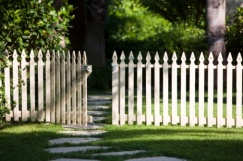 Homeowners often ask their estate agents what pre-sale upgrades are likely to give them the best return on their investment, in the form of a higher sale price – and the answer, at the moment, is not a kitchen or bathroom makeover, but exterior updates that improve curb appeal.
Homeowners often ask their estate agents what pre-sale upgrades are likely to give them the best return on their investment, in the form of a higher sale price – and the answer, at the moment, is not a kitchen or bathroom makeover, but exterior updates that improve curb appeal.
This is the finding of the 2012/2013 Cost vs Value Report published by Remodeling magazine, which annually surveys thousands of agents and valuers before listing the 35 most cost-effective home improvement projects for home sellers.
Some of these don’t apply in SA because of the different home construction methods used, but many do, including the one right at the top of the list this year, which is front door replacement – preferably with a steel door. This, it is estimated, will deliver an 85,6% return on expenditure when the home is sold.
Also among the 10 most cost-effective midrange projects were several other exterior upgrades that would be applicable here, including the addition of a wooden deck to the entertainment area (estimated 77,3% return); the replacement of an old garage door with a new one (75,7%); the replacement of steel window-frames with wooden ones (73,3%), the replacement of steel window-frames with vinyl ones (71,2%) and the addition of a composite (non-wood) deck (67,5%).
A minor kitchen remodel, done right, can also bring a good return of around 75%, but both major kitchen and bathroom remodels will give sellers a return on their investment of less than 60%.
In short, the best bet for sellers in the current market is really to focus on improving the “first impression” of their properties. In addition, the magazine notes, the use of durable, low-maintenance materials in the suggested replacement projects appeals to homebuyers who are increasingly looking to reduce both the operational and maintenance costs of their homes.”
8 Ways to sell your house faster
Apart from baking cookies prior to viewers stopping by, making sure all the lights are on and finding a super-savvy real estate agent to back you up, there are a few other, lesser-known and more creative ways to make sure your house gets ‘SOLD’.
- Get snap-happy when doing online listings. A recent real estate study showed that listings with more than 6 pictures are twice as likely to be viewed by buyers compared to listings that had fewer than 6 pictures.
- Post a video love letter about your home on YouTube. Walk through your home and down your street telling prospective buyers about your favourite places in the area and your favourite parts of the home. Buyers like to know that a home was loved and looked after, and it might help them to picture themselves in your shoes.
- If you know of a local message board or you belong to a neighbourhood email list, send a link to your home’s online listing to your neighbours. Invite your neighbours to your open house and let them talk to prospective buyers, they might even invite some house hunters they know who have always wanted to live in the area.
- Use Facebook. Facebook is the great connector – you know how quickly a popular video can go viral, now imagine how far word of your great house can spread if your friends, and your friends’ friends start talking about it.
- Include some other assets in the deal. This can make your house stand out in the mind of the buyer, especially if it is relevant to the property or something coveted by the buyer. Think custom fitted drapes, new kitchen appliances or a mounted TV in the bedroom.
- Keep up the condition. Make sure your house looks as good as you can afford to keep it. Get rid of any pests, make sure that none of your windows are broken, the paint is fresh and the doorknobs are new.
- Stage your home and your garden. Real Estate Agents know how important it is to ‘stage’ a house so that others can imagine living there. For example, put a fruit bowl on the kitchen counter, clean cushions on the patio furniture and fresh cut flowers in the lounge.
- Pretend you are moving out and take all the things that make your home ‘yours’, this includes family photos, memorabilia and tacky collectibles. Buyers want to visualise your house being their house – and it is difficult for them to do that when there are reminders of your life everywhere.
